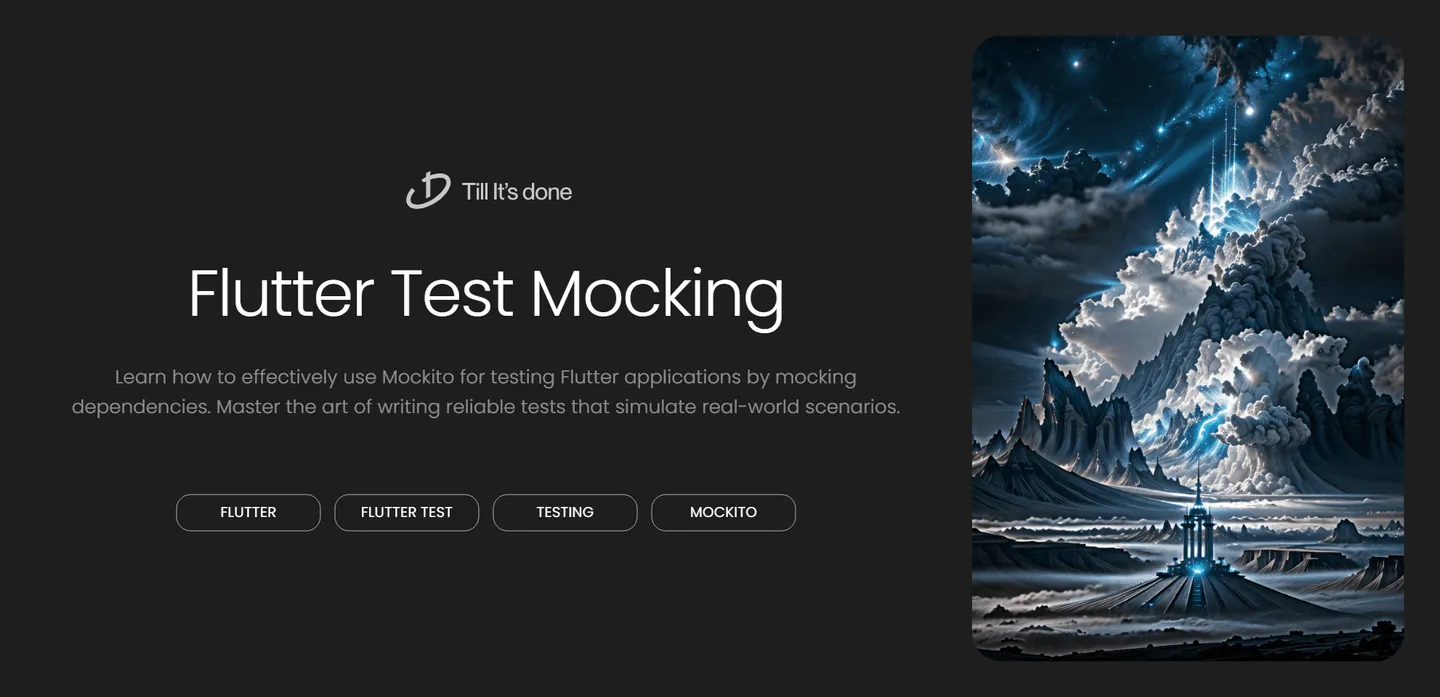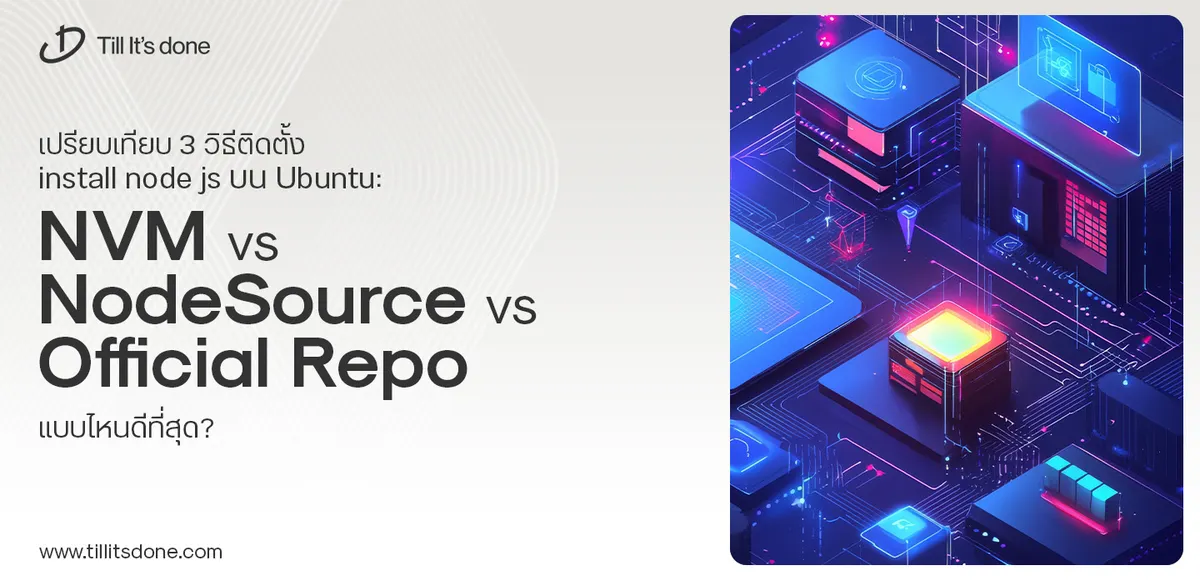- Services
- Case Studies
- Technologies
- NextJs development
- Flutter development
- NodeJs development
- ReactJs development
- About
- Contact
- Tools
- Blogs
- FAQ
Mocking Dependencies in Flutter Test with Mockito
Master the art of writing reliable tests that simulate real-world scenarios.


Mocking Dependencies in Flutter Test with Mockito
Testing is a crucial part of developing robust Flutter applications, but what happens when your code depends on external services, APIs, or complex objects? This is where mocking comes into play, and Mockito is your best friend for handling these scenarios elegantly.
Understanding the Importance of Mocking
In real-world Flutter applications, we often work with dependencies like HTTP clients, databases, or platform-specific services. Testing these dependencies directly can be challenging because:
- They might be unreliable or slow
- They could cost money to use
- They might not be available in a test environment

Getting Started with Mockito
First, add the required dependencies to your pubspec.yaml:
dev_dependencies: mockito: ^5.4.0 build_runner: ^2.4.0Let’s say we have a simple weather service that fetches the current temperature:
class WeatherService { final HttpClient client;
WeatherService(this.client);
Future<double> getTemperature(String city) async { final response = await client.get('api.weather.com/temperature/$city'); return response.data['temperature']; }}To test this service, we’ll create a mock of the HttpClient:
@GenerateMocks([HttpClient])void main() { late MockHttpClient mockClient; late WeatherService weatherService;
setUp(() { mockClient = MockHttpClient(); weatherService = WeatherService(mockClient); });
test('should return correct temperature', () async { // Arrange when(mockClient.get(any)) .thenAnswer((_) async => Response(data: {'temperature': 25.0}));
// Act final temperature = await weatherService.getTemperature('London');
// Assert expect(temperature, 25.0); verify(mockClient.get('api.weather.com/temperature/London')).called(1); });}
Best Practices for Mocking in Flutter
-
Mock at the Right Level: Mock at interface boundaries rather than mocking every small class. This makes your tests more maintainable and less brittle.
-
Verify Behavior: Don’t just test the output – verify that your mocks were called with the expected parameters using
verify(). -
Use Meaningful Responses: When setting up mock responses, use realistic data that represents actual scenarios your app might encounter.
-
Keep it Simple: Don’t over-mock. If a dependency is simple and reliable (like basic calculations), use the real implementation.
Here’s how to handle more complex scenarios:
test('should handle errors gracefully', () async { // Arrange when(mockClient.get(any)) .thenThrow(Exception('Network error'));
// Act & Assert expect( () => weatherService.getTemperature('London'), throwsException, );});Conclusion
Mocking with Mockito is an essential skill for writing effective Flutter tests. It allows you to isolate the code you’re testing, make your tests more reliable, and ensure your app works correctly under various conditions.
Remember, the goal of mocking isn’t to test the mocks themselves, but to verify that your code interacts with its dependencies correctly.

 สร้างเว็บไซต์ 1 เว็บ ต้องใช้งบเท่าไหร่? เจาะลึกทุกองค์ประกอบ website development cost อยากสร้างเว็บไซต์แต่ไม่มั่นใจในเรื่องของงบประมาณ อ่านสรุปเจาะลึกตั้งแต่ดีไซน์, ฟังก์ชัน และการดูแล พร้อมตัวอย่างงบจริงจาก Till it’s done ที่แผนชัด งบไม่บานปลายแน่นอน
สร้างเว็บไซต์ 1 เว็บ ต้องใช้งบเท่าไหร่? เจาะลึกทุกองค์ประกอบ website development cost อยากสร้างเว็บไซต์แต่ไม่มั่นใจในเรื่องของงบประมาณ อ่านสรุปเจาะลึกตั้งแต่ดีไซน์, ฟังก์ชัน และการดูแล พร้อมตัวอย่างงบจริงจาก Till it’s done ที่แผนชัด งบไม่บานปลายแน่นอน  Next.js สอน 14 ขั้นตอนเบื้องต้น: สร้างโปรเจกต์แรกใน 30 นาที เริ่มต้นกับ Next.js ใน 14 ขั้นตอนเพียงแค่ 30 นาที พร้อม SSR/SSG และ API Routes ด้วยตัวอย่างโค้ดง่าย ๆ อ่านต่อเพื่อสร้างโปรเจ็กต์แรกได้ทันทีที่นี่
Next.js สอน 14 ขั้นตอนเบื้องต้น: สร้างโปรเจกต์แรกใน 30 นาที เริ่มต้นกับ Next.js ใน 14 ขั้นตอนเพียงแค่ 30 นาที พร้อม SSR/SSG และ API Routes ด้วยตัวอย่างโค้ดง่าย ๆ อ่านต่อเพื่อสร้างโปรเจ็กต์แรกได้ทันทีที่นี่  วิธีสมัคร Apple Developer Account เพื่อนำแอปขึ้น App Store ทีละขั้นตอน อยากปล่อยแอปบน App Store ระดับโลก มาอ่านคู่มือสมัคร Apple Developer Account พร้อมเคล็ดลับ TestFlight และวิธีอัปโหลดที่ง่ายในบทความเดียวนี้ได้เลย
วิธีสมัคร Apple Developer Account เพื่อนำแอปขึ้น App Store ทีละขั้นตอน อยากปล่อยแอปบน App Store ระดับโลก มาอ่านคู่มือสมัคร Apple Developer Account พร้อมเคล็ดลับ TestFlight และวิธีอัปโหลดที่ง่ายในบทความเดียวนี้ได้เลย  TypeScript Interface คืออะไร? อธิบายพร้อมวิธีใช้และข้อแตกต่างจาก Type เรียนรู้วิธีใช้ TypeScript Interface เพื่อสร้างโครงสร้างข้อมูลที่ปลอดภัยและเข้าใจง่าย พร้อมเปรียบเทียบข้อดีข้อแตกต่างกับ Type ที่คุณต้องรู้ ถูกรวมเอาไว้ในบทความนี้แล้ว
TypeScript Interface คืออะไร? อธิบายพร้อมวิธีใช้และข้อแตกต่างจาก Type เรียนรู้วิธีใช้ TypeScript Interface เพื่อสร้างโครงสร้างข้อมูลที่ปลอดภัยและเข้าใจง่าย พร้อมเปรียบเทียบข้อดีข้อแตกต่างกับ Type ที่คุณต้องรู้ ถูกรวมเอาไว้ในบทความนี้แล้ว  Material-UI (MUI) คืออะไร อยากสร้าง UI สวยงามและเป็นมืออาชีพในเวลาอันรวดเร็วใช่ไหม มาทำความรู้จักกับ Material-UI (MUI) ที่ช่วยให้คุณพัฒนาแอปพลิเคชันบน React ได้ง่ายและดูดีในทุกอุปกรณ์
Material-UI (MUI) คืออะไร อยากสร้าง UI สวยงามและเป็นมืออาชีพในเวลาอันรวดเร็วใช่ไหม มาทำความรู้จักกับ Material-UI (MUI) ที่ช่วยให้คุณพัฒนาแอปพลิเคชันบน React ได้ง่ายและดูดีในทุกอุปกรณ์  เปรียบเทียบ 3 วิธีติดตั้ง install node js บน Ubuntu: NVM vs NodeSource vs Official Repo แบบไหนดีที่สุด? เรียนรู้วิธีติดตั้ง Node.js บน Ubuntu ด้วย NVM, NodeSource หรือ Official Repo เลือกวิธีที่เหมาะกับความต้องการของคุณ พร้อมเปรียบเทียบ เพื่อการพัฒนาที่มีประสิทธิภาพ!
เปรียบเทียบ 3 วิธีติดตั้ง install node js บน Ubuntu: NVM vs NodeSource vs Official Repo แบบไหนดีที่สุด? เรียนรู้วิธีติดตั้ง Node.js บน Ubuntu ด้วย NVM, NodeSource หรือ Official Repo เลือกวิธีที่เหมาะกับความต้องการของคุณ พร้อมเปรียบเทียบ เพื่อการพัฒนาที่มีประสิทธิภาพ! Talk with CEO
We'll be right here with you every step of the way.
We'll be here, prepared to commence this promising collaboration.
Whether you're curious about features, warranties, or shopping policies, we provide comprehensive answers to assist you.


